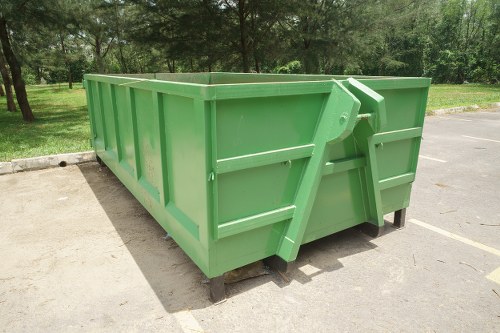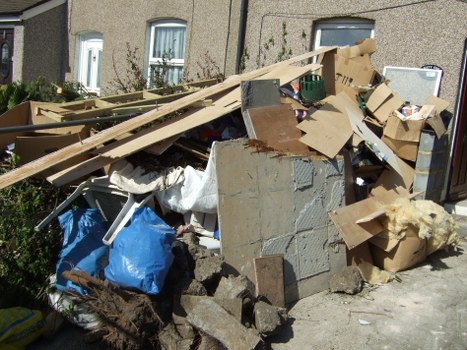Effective Construction Waste Clearance in Notting Hill

The Importance of Construction Waste Clearance
Construction projects, whether residential or commercial, generate a significant amount of waste. Proper construction waste clearance in Notting Hill is essential to maintain a clean and safe environment. Not only does it help in reducing the clutter on site, but it also ensures compliance with local regulations.
Neglecting waste management can lead to various hazards, including accidents and environmental damage. Efficient clearance minimizes these risks and promotes a healthier workspace for everyone involved.
Moreover, responsible waste clearance contributes to sustainability efforts by ensuring that recyclable materials are processed appropriately. This reduces the overall environmental footprint of construction activities in the vibrant community of Notting Hill.

Types of Construction Waste
1. Concrete and Masonry
Concrete debris is one of the most common types of construction waste. It includes broken bricks, blocks, and slabs that result from demolition or renovation activities.
2. Wood and Timber
Wood waste comprises off-cuts, pallets, and other timber materials that are no longer needed after construction. Proper disposal or recycling of wood is crucial to prevent environmental harm.
3. Metals
Metal waste includes discarded steel, aluminum, and copper. Recycling metals not only conserves resources but also reduces the need for mining new materials.

Benefits of Professional Waste Clearance Services
Hiring a professional waste clearance service in Notting Hill ensures that all types of construction debris are handled efficiently and responsibly. Experts have the necessary equipment and knowledge to sort, recycle, and dispose of waste properly.
Professional services also help in maintaining project timelines by providing timely waste removal, which can prevent delays and allow construction work to proceed smoothly.
Additionally, professional waste clearance contributes to a positive reputation for construction companies, showcasing their commitment to environmental responsibility and community well-being.

Local Regulations in Notting Hill
Notting Hill has specific regulations governing construction waste disposal to ensure environmental protection and public safety. It's essential to be aware of these rules to avoid legal penalties and fines.
Regulations may include requirements for sorting recyclable materials, obtaining permits for large-scale waste removal, and adhering to specific disposal methods for hazardous waste.
Compliance with local laws not only ensures smooth project execution but also demonstrates respect for the community and its environmental standards.

Choosing the Right Waste Clearance Company
Experience and Expertise
When selecting a construction waste clearance service in Notting Hill, it's important to consider the company's experience and expertise. Experienced companies are more likely to handle waste efficiently and comply with all regulations.
Comprehensive Services
A reliable waste clearance company should offer a wide range of services, including collection, sorting, recycling, and disposal. Comprehensive services ensure that all aspects of waste management are covered.
Customer Reviews and Testimonials
Checking customer reviews and testimonials can provide valuable insights into the quality of service offered by a waste clearance company. Positive feedback indicates reliability and customer satisfaction.
Steps in the Waste Clearance Process
The waste clearance process typically involves several key steps to ensure efficient and responsible disposal:
- Assessment: Evaluating the type and volume of waste generated.
- Sorting: Separating recyclable materials from non-recyclable waste.
- Collection: Gathering waste from the construction site.
- Transportation: Moving waste to appropriate recycling or disposal facilities.
- Disposal: Properly disposing of non-recyclable waste in compliance with regulations.
Environmental Impact and Sustainability
Effective construction waste clearance plays a significant role in minimizing the environmental impact of construction activities. By recycling materials and reducing landfill usage, the overall carbon footprint of projects is lowered.
Sustainability practices in waste management contribute to the conservation of natural resources and promote a circular economy where materials are reused and repurposed.
Adopting eco-friendly waste clearance methods aligns with global efforts to combat climate change and preserve the environment for future generations.
Cost Factors in Construction Waste Clearance
The cost of waste clearance services can vary based on several factors. Understanding these factors can help in budgeting and selecting the most cost-effective solutions:
- Volume of Waste: Larger volumes typically incur higher costs due to increased transportation and disposal expenses.
- Type of Waste: Hazardous or specialized waste may require specific handling procedures, affecting the overall cost.
- Frequency of Service: Regular clearance services may offer discounted rates compared to one-time pickups.
- Location: Proximity to disposal facilities can influence transportation costs.
Tips for Efficient Waste Management
Implementing efficient waste management practices can significantly reduce the burden of construction waste clearance:
- Plan Ahead: Assess potential waste generation early in the project to arrange timely clearance services.
- Sort on Site: Organizing waste into categories on-site facilitates easier recycling and disposal.
- Reuse Materials: Whenever possible, repurpose materials to minimize the amount of waste requiring clearance.
- Monitor Waste Levels: Regularly track waste accumulation to avoid overflows and ensure continuous clearance.
By following these tips, construction projects in Notting Hill can achieve more sustainable and cost-effective waste management.
Conclusion
Construction waste clearance is a critical component of any building project in Notting Hill. It ensures the safety, efficiency, and sustainability of construction activities. By partnering with professional waste clearance services, adhering to local regulations, and implementing effective waste management practices, construction projects can contribute positively to the community and the environment.
Don't let construction waste overwhelm your project. Contact us today to schedule your construction waste clearance and keep your site clean and compliant.